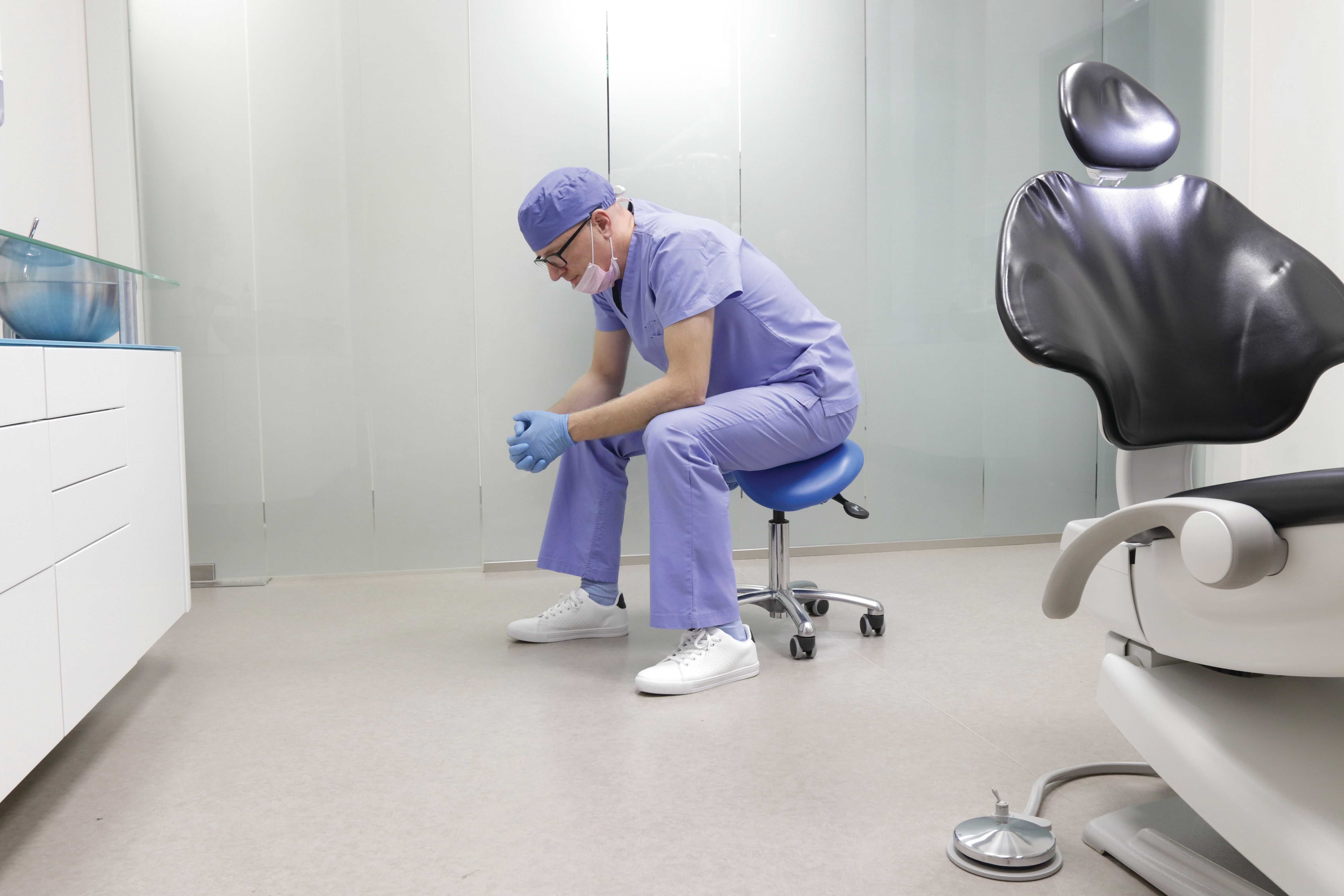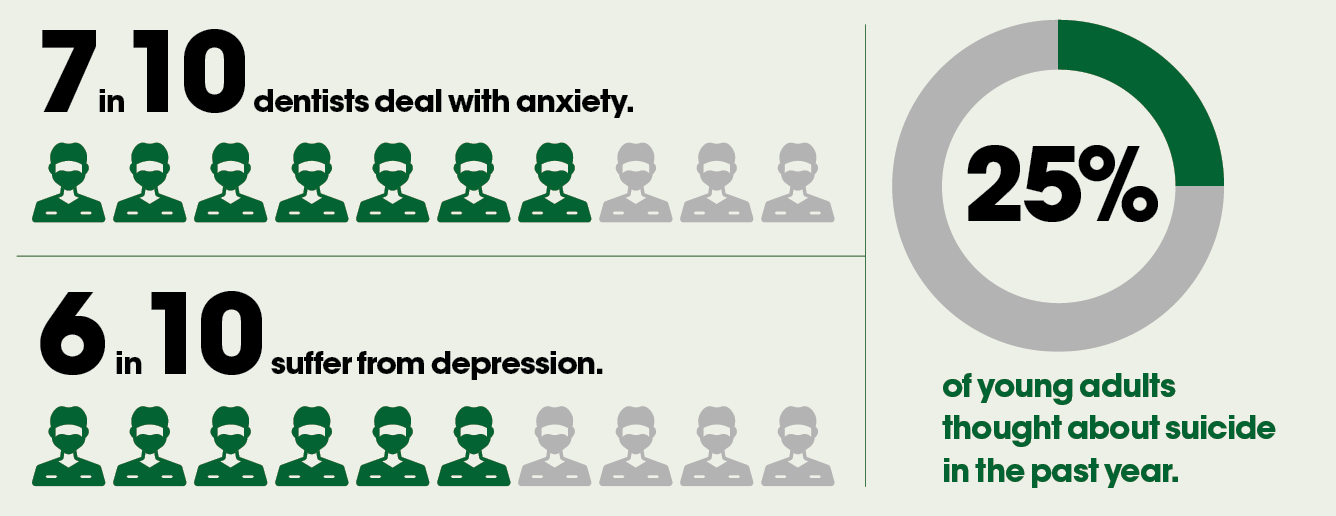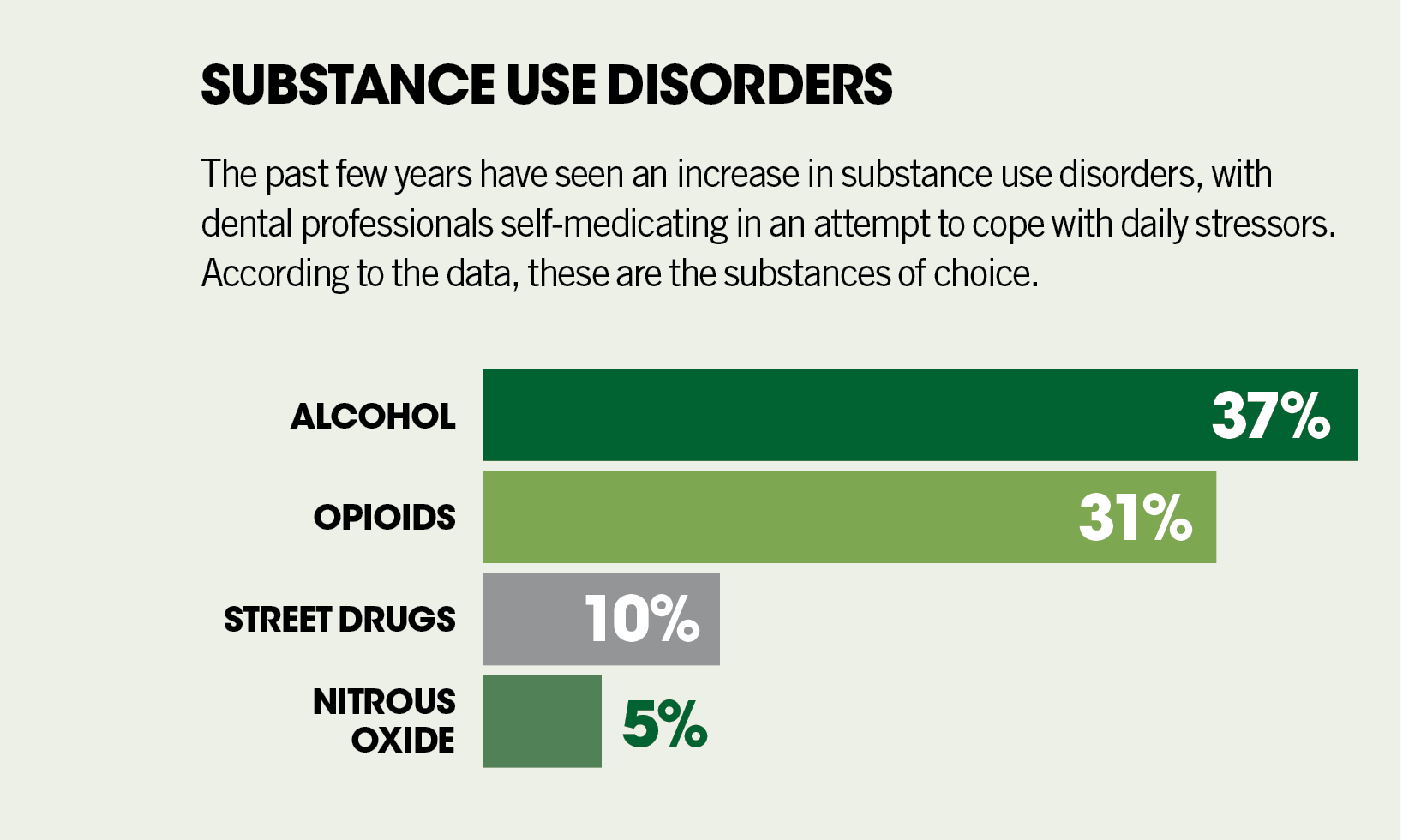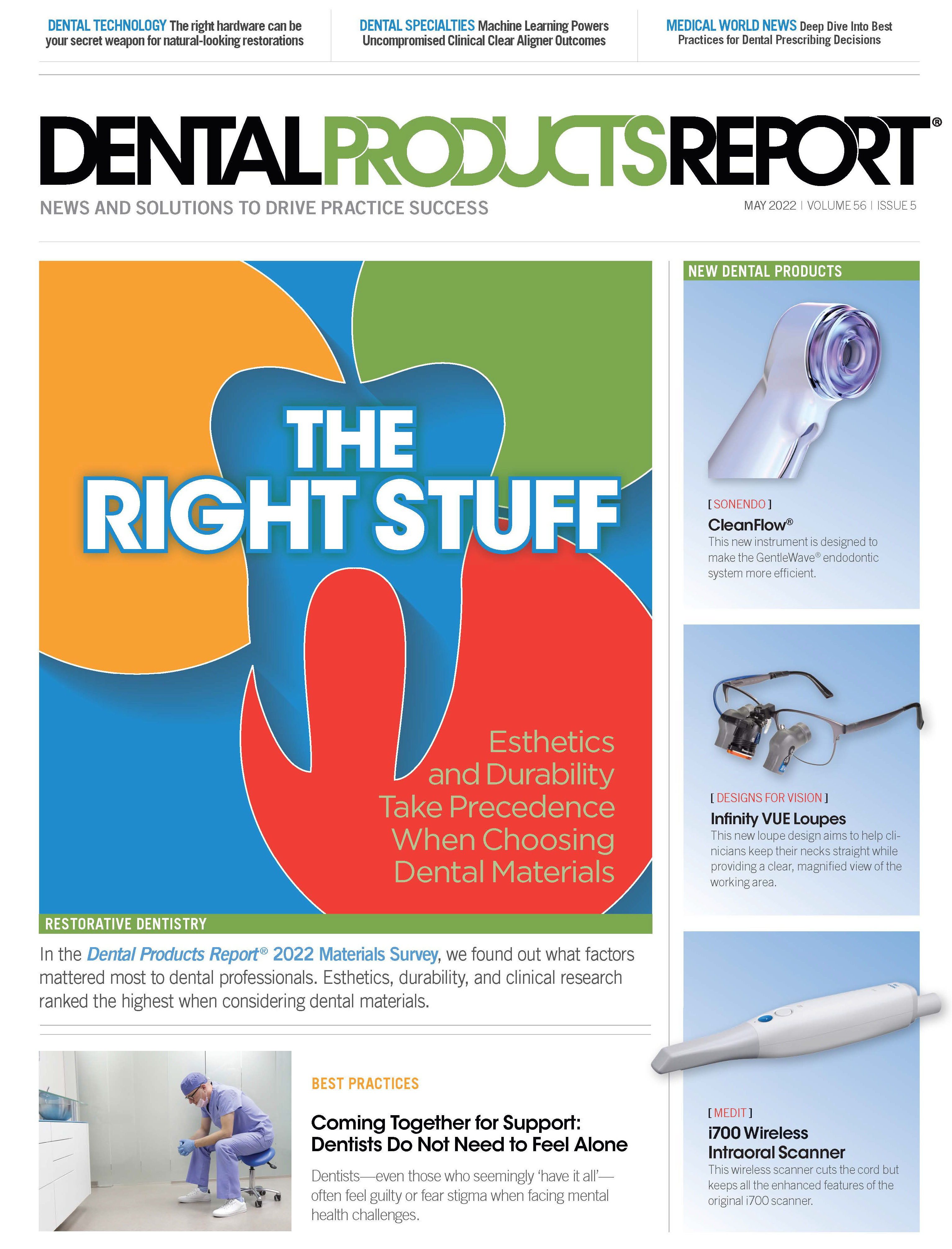Coming Together for Support:Dentists Do Not Need to Feel Alone
Dentists—even those who seemingly have it all—often feel guilty or fear stigma when facing mental health challenges.
endostock / stock.adobe.com

Dentistry can be a lonely profession, leaving you feeling pressure to be everything to everyone. Whether you feel internal or external pressure, it can challenge your mental health and wellness. The topic of mental health awareness and self-care has been quietly brushed under the rug for generations, leaving those who struggle afraid to seek help. Mental health and wellness are gaining more attention due to world events and the effects of isolation in recent years. “No man is an island” has never been a truer sentiment; as individuals, we were separated from loved ones and the human touch by necessity rather than choice. The importance of staying connected to others was quickly realized, and depression took hold for many.
Increased awareness, acceptance, and strategies have lessened the stigma of seeking help when things become unbearable, or when addiction takes hold. We witnessed Olympians and professional athletes publicly recognizing the need to step aside to address their mental wellness when the pressure was overwhelming. Society applauded their awareness and the normalizing of the importance of self-care. Even with the evolution of acceptance and the decreased stigma regarding mental wellness and self-care, it remains difficult to seek help from a stranger. Know you are not alone; it is a common struggle experienced by many.
According to the Dental Avengers, a group of mental health advocates in the dental industry, 7 in 10 dentists deal with anxiety and 6 in 10 suffer from depression.1 Most notably, 25% of young adults thought about suicide in the past year.2 Dentists often feel guilty for experiencing mental health challenges when, on the surface, they “have it all”—a great career, family, financial stability, yet their mental well-being still faces challenges. Depression, anxiety, and suicidal thoughts are not restricted by demographics, career paths, or financial status.
Patients’ complaints about dental treatment recommendations, staff conflict, and the stress of operating a business while continuing to provide excellent care can be daunting. Many patients openly express their dislike of the dentist, when often it stems from their fear of treatment and pain. Sometimes the dentist finds it difficult to establish a rapport with patients due to patient anxiety. Most dentists are not taught business acumen in dental school and are thrown into the role of boss, manager, or owner soon after graduation. With many being solo practice owners, they are left to figure it out themselves or rely on the advice of others. Dentists often cite the unexpected challenges of business when they got into dentistry to care for others. The growth of the dental service organization market has given dentists the opportunity to choose a variety of career paths, whether associate dentist or business owner.
Data from the 2021 Mental Wellness Summit from the Dental Avengers1 and from an August 2020 article published by Politico.2

The past few years have brought unexpected challenges for society as a whole and dentists everywhere. Stressors include lack of staffing, increased supply costs, and patients who are reluctant to return to care, all of which equate to less earnings. A recent study by the American Dental Association (ADA) demonstrates the continued exit of hygienists from the job market, leaving dentists to balance patient needs while losing production.3 The responsibility of keeping the staff you retain happy while managing an understaffed business will weigh on nearly everyone. The stressors of being everything to everyone can lead to depression or the expression of other conditions that can include anxiety and bipolar disorder.
Sue Jeffries of the Dental Mental Network, based in Sneads Ferry, North Carolina, says the biggest issue dental providers face regarding mental wellness involves the stigma of seeking help and fear of repercussions. Fear of judgment, losing their practice, patients leaving, and losing family and livelihood are all common deterrents to seeking professional care. In her experience, dental workers feel they are an island and must try to find a strategy to secretly deal with problems on their own.
The past few years have seen an increase in substance use disorders, with dental professionals self-medicating in an attempt to cope with daily stressors. According to the data, the substance of choice is alcohol (37%) followed by opioids (31%), street drugs (10%), and nitrous oxide (5%).4 The accessibility of opioids and nitrous oxide within a dental practice makes them a common substance of choice. Dental communities across the country have mourned colleagues who felt isolated and faced addiction alone until they were beyond help.
Constant workplace stress that is not well managed is the leading cause of burnout. Many dental professionals are self-proclaimed perfectionists and strive to succeed in all they do. Pressure to earn more, work more, and be present with family or have a social life is often self-imposed. In caring for others’ needs, dentists often put themselves last. The balance of work, family, and business often teeters. This stress flows into every aspect of daily life, affecting work and relationships and becoming exhausting. It often manifests in the dental practice and negativity flows throughout the team; an individual may appear closed off and unapproachable, ultimately leading to decreased quality of care or unhappy staff members. Take time to assess your practice and envision what career you want and what it will take to make that ideal happen. Consider hiring a consultant whose focus is on the type of practice you want to lead, finding the balance between work and life. The investments in a consultant may be worth your overall happiness in return.
Data from a 2011 study on drug abuse/dependence among dentists.4

We are in the field of caring for others and putting ourselves, our feelings, and self-care on the back burner until the flame burns too hot, leading to destructive behaviors or worse. Jeffries often asks, “If you do not seek help, how do you imagine your life in 6 months? If you do seek professional guidance and strategies, what do your professional and personal life look like in 6 months?” Self-honesty, acceptance, and the desire to make a change are sometimes the most difficult first steps. The stigma surrounding mental wellness continues to be present in the minds of dental professionals and fear of the unknown is a valid concern. There are resources to guide you to improved mental wellness and happiness so that you can find the right balance in life.
Solutions to Improve Mental Well-being
The ADA recognizes the stress dentists feel and has developed resources and support to focus on the importance of work-life balance.3 A happier work environment can bring more productivity to your team and enhance your family life as well. Patients recognize when a dental practice’s morale is fractured and when the staff acts as a team. Many struggle with mental wellness at some point. No one solution works for everyone; the key is to find what works for you or your loved ones. Recognize that it will take time and that some strategies or therapies will need to be revisited occasionally to maintain your well-being.
Find your tribe and support network: Those you can confide in and who can provide the life raft from the island of solitude. This can be as simple as joining a social function, dental education group, or volunteering within your community. Mommy Dentists in Business created a network of nearly 9000 members who come together to support, learn from, and empower one another through life.
You can find support and help from those within the dental community who have experienced trauma, depression, anxiety, and other mental health challenges and who are willing to connect and discuss strategies that work well for others. Connect with organizations such as the Dental Mental Network, Dental Yogis, Dental Avengers, or others and realize that depression and anxiety are common challenges.
The solitude of dentistry is beginning to give way to collaboration, networking, and like-minded professionals finding each other for support.
Be kind to yourself: We have become a society always on the go, rarely slowing down to recognize the importance of self-care. Constantly comparing your career, family, and material items to those of your peers and striving to be the best weighs heavily on your physical and mental health.
Do not judge yourself or your business success by what you see on social media; it is often not a clear reflection of reality. It takes practice to be self-aware and to cope with negative feelings. Treat yourself with kindness and respect; celebrate your wins and those of your team and family. Be present in the moment and embrace positive occurrences around you.
Seek professional help: There is no shame in finding strategies to help improve your mental well-being. Whether seeking help for depression, mental illness, suicidal thoughts, or addiction, there are available resources that will offer you as much or as little help as desired. If you recognize the traits of mental illness or depression in others, provide support and encouragement while they recognize it within themselves.
It is difficult to ask for help, and some may be ready before others to address the reasons. Many mental disorders have hereditary or chemical imbalance as a contributing cause. Just as a diabetic would seek professional help to control the disease process, mental illness may require medical or psychological intervention for a happier, healthier life.
Just as our profession incorporated teledentistry technology for the convenience of staying connected to patients, consider teletherapy options to acquire the help needed. Companies such as Talkspace offer convenient, discreet, online therapy solutions connecting you with a licensed therapist based upon your needs at almost any time of the day.
Do not underestimate the importance of movement: Dentistry is associated with long periods of sitting, often while contorted into awkward positions to access the distal of a maxillary molar. Many dental practitioners will develop a musculoskeletal disorder, leading to pain or injury. When your body hurts, your mood is also affected. Chronic neck, back, hip, or wrist pain can keep you from doing things you enjoy.
Studies demonstrate the positive effects of exercise on mental well-being. Not only does exercise reduce risk of long-term chronic disease, it helps reduce anxiety, stress, and depression.5 Combined with a healthy diet, exercise can not only help improve mental health, but it can also help ensure career longevity with the body being healthy and strong.
Evaluate your sleep habits: We often rob from our sleep schedules to achieve all we did not get done during the day. Quality sleep improves mood, health, and brain performance. The National Institutes of Health recommends avoiding caffeine from 6 to 8 hours before bedtime. Establish a routine. Avoid alcohol and heavy meals before bedtime because they can disrupt a deep sleep cycle. Our bodies need time to heal and prepare for the following day, which is accomplished with quality sleep.
Practice self-care and get back to doing things you enjoy: Slow down and assess what your key motivators in happiness look like. Take a walk, read a book, or enjoy a cup of coffee and a sunrise. Whatever your ideal “me” time looks like, get back to it. As caretakers of others, moms, dads, partners, and bosses, we often forget about our own happiness. The more stable our own well-being, the better we can be for those around us.
The importance of mental health and emotional well-being are becoming more prominent in society. The stress of daily life combined with a pandemic has brought to light the importance of self-care in overall health. Social acceptance has reduced stigma attached to advocating for one’s personal health and recognizing when a break or professional help are needed. Implementing daily strategies to help reduce stress, anxiety, and depression can lead to a better work-life balance outside the operatory.
References
- Mental Wellness Summit 2021. Dental Avengers. Accessed March 7, 2022. https://www.dentalavengers.com/#Header
- Ehley B. One quarter of young adults contemplated suicide during pandemic. Politico. August 13, 2020. Accessed March 7, 2022. https://www.politico.com/news/2020/08/13/cdc-mental-health-pandemic-394832
- Health and wellness. American Dental Association. Accessed March 7, 2022. https://www.ada.org/resources/practice/health-and-wellness
- Fung EYK, Lange BM. Impact of drug abuse/dependence on dentists. Gen Dent. 2011;59(5):356-359; quiz 360-361.
- Sharma A, Madaan V, Petty FD. Exercise for mental health. Prim Care Companion J Clin Psychiatry. 2006;8(2):106. doi:10.4088/pcc.v08n0208a
